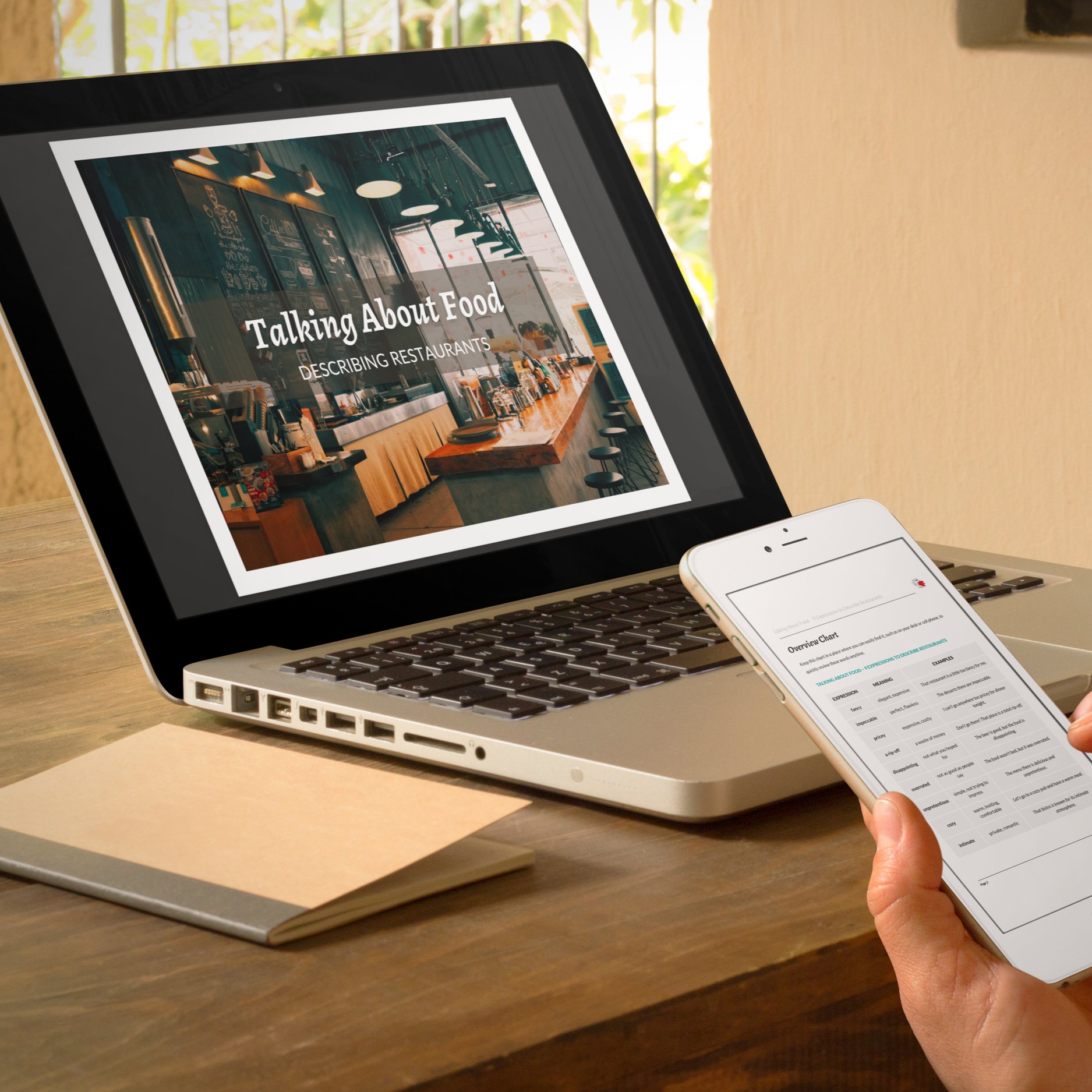How Can I Build Up the Confidence to Start and Carry an English Conversation with Anyone?
You’ve probably figured out that having conversations in English isn’t just about learning everything you possibly can. It’s about building your confidence to start and carry those conversations, too.
As a teacher, this is one of the most significant areas of struggle for my students.
I can give you all the encouragement and language preparation possible. Still, if you don’t believe in your own abilities, it will be much more difficult for you to strike up an interesting conversation with your English-speaking colleagues and acquaintances or with new people that you meet on your travels.
Maybe you’ve even had this conversation with your English teacher before.
“My goal with English is to do x, y, or z, but I can’t because my English is still so bad,” you say.
“Your English isn’t bad! You just need a bit more practice,” says your teacher.
“Thank you, but I know that’s not true.”
When my students say that, I know there’s not much I can say to convince them of the opposite.
But I can show them, over time, the things they have been able to accomplish with English. They’ve been able to do things like carrying a conversation with me, talking to a colleague, applying for a job, attending a job interview, writing an essay, or traveling to an English-speaking country without worrying too much.
In other words, they gain confidence by seeing what they’re specifically able to do in English.
So, how can you believe in yourself enough to start an English conversation with anyone?
Today, we’re going to talk about six tips and strategies to build up your confidence with speaking:
Shift your mindset about making mistakes.
Do your “homework” before a conversation.
Practice these “pocket phrases” for different situations.
Talk to strangers.
Talk to a teacher.
Make a list of everything you’ve accomplished in English so far.
So, if you’re ready for a shift in perspective and some helpful strategies, let’s get started!
Teaching English Just Got Easier
Save hours of time with an organized collection of high quality, easy-prep ESL lesson plans and worksheets right at your fingertips!
How to Build Up Your Confidence in English
Shift Your Mindset About Making Mistakes
Remember that learning a language involves two elements: accuracy and fluency.
But conversation is usually more about fluency than it is about accuracy, so if you’re going to engage in a conversation with someone, you need to be prepared to focus a little less on accuracy.
In other words, you need to get ready to make mistakes.
Try to frame it in this way: We all have to make mistakes to gain fluency. Making mistakes is the “price of admission” for becoming more confident in conversation.
Or tell yourself, “I’m going to make mistakes in English. And that’s okay. Improving my speaking is worth making mistakes.
You can also think of it like a game of tennis. When you play your first game of tennis or volleyball, the first thing you try to do is keep the ball in the air and off the ground. But the only way you will improve is if you’re willing to drop the ball over and over. Sometimes in conversation, you’re going to drop the ball, and that’s okay. You just have to pick it up again.
Do Your “Homework” Before a Conversation
There’s a reason why people call it the “art” of conversation. It’s because conversation is more than an exchange of language. Another reason why it can be so hard for English learners to gain confidence in conversation is that there’s a bit of style and craft that goes into it.
Start by observing anyone skilled in meeting and talking to new people. They don’t have to speak English, but you should pay attention to the phrases they use. How do they engage people? How do they keep the conversation going? Do they ask questions? Do they do most of the talking?
You’ll probably notice that the most successful conversationalists ask lots of follow up questions, and they also listen intently.
In an article about conversation for the New York Times, Harvard Business professor and researcher Dr. Alison Wood Brooks suggests doing some “homework” before talking to someone new. For example, if you know what topics might be interesting to your conversation partner, write down two or three possible ideas for a discussion topic.
Because here’s the truth about making connections with people in conversation:
People like it when you ask them questions.
People like it when you talk about things that interest them.
People like it when you listen to them.
People like it when you ask them for advice or suggestions.
Practice These “Pocket Phrases” for Different Situations
Starting a natural conversation with anyone in English isn’t just about your knowledge of the language. It’s about understanding how to make a genuine and graceful entrance into the beginning of an interaction.
And that can sometimes be tricky because introductions are awkward in any language, and finding a good excuse to talk to someone sometimes feels intimidating.
So, keeping some “pocket phrases” ready to go for different situations will make you feel more comfortable and prepared for different occasions when you might have to talk to strangers in English.
Phrases like these will help you to begin conversations in a way that feels more natural and organic. Because it can feel awkward just to walk up to someone and say, “Hello, I’m [NAME]. What’s yours?”
Try these more natural ways to introduce yourself
“Are you here for the ________ too? I’m [Name], by the way.”
“Well, since we’ll probably be in this line for a while, I’m [Name]! Nice to meet you!”
“Are you seated at my table, too? Great! I’m [Name].”
Offer someone a compliment and a question to start chatting with them
“I like your glasses. Where did you find those?”
“I really liked what you said about ________. What made you say that?”
“I’ve been looking for some shoes like those. What style would you say those are?”
Pair an observation with an open-ended question to get the conversation flowing
“What the speaker said about ________ was so interesting. What did you think about it?”
“I found _______ really fascinating. Was it just me?”
“I’ve never thought about _________ like that before. Have you?”
Ask for someone’s advice or suggestions to create more connections in conversation
“If you know of any good coffee shops in the area, I’d love to hear your suggestions.”
“Are there any good movies out right now? I’m looking for something to do this weekend.”
“We’re looking for a good dentist. Who would you recommend?”
Talk to Strangers
A great way to build up your confidence with starting a conversation is to talk to strangers. And if you’re thinking, “But wait! How can I talk to strangers before I have enough confidence?”
Here’s the thing: I’m talking about complete strangers who are in the same position as you. They may want to practice their English, or they’re just looking for other strangers to talk to outside of their friends, family, or the professional world.
So, how can you find strangers to talk to?
If you’re willing to get creative, there are lots of ways to make it happen.
Reddit and Quora
Forum sites like Reddit and Quora are a great place to practice having conversations with strangers online. While your interactions will be in a written format, it will still help you practice informal writing and get a sense of how strangers interact in English.
Language partner apps
You can find language partner apps like HelloTalk or Tandem to connect with other people online. Once you find an English-speaking language partner, you can divide your conversations in half; you’ll spend part of the conversation speaking English and the other part speaking your native language.
English-speaking groups on Meetup
You can also find English-speaking groups for anything you like on Meetup, and you can attend live or virtual events where you can meet new people.
The idea is to get out there and force yourself to meet new people you might not meet at work or in your area. Once you’ve had a few conversations with strangers in English, you’ll prove to yourself that it’s possible.
Talk to a Teacher
Think of an English teacher as a non-judgmental stranger whose goal is to help you improve. How great is that?
When you find the right teacher for you, try to be as specific as you can about what you want to accomplish. If you don’t feel confident about your speaking, your teacher can help you identify precisely what’s making you doubt yourself.
And don’t forget to talk to your teacher about topics that interest you, and ask them if you can sometimes practice having a free and natural conversation that you might have with a friend or an acquaintance. There’s nothing that makes you feel more capable of speaking another language than being able to have a free-flowing conversation that feels natural.
After every lesson or every conversation with a teacher, tell yourself, “Wow. I just spoke in English for an entire hour. That’s amazing.” Doing this will create positive associations in your brain about English, which will make you want to keep practicing.
Make a List of Everything You’ve Accomplished
As I mentioned earlier, making a list of all your accomplishments will help you build up your confidence with actual evidence!
So, sit down with a piece of paper and pen, and write it out. Think about what you’ve done in English so far. For example:
I’ve had a total of four hours of conversation with my English teacher.
I’ve applied for a job in English.
I’ve written almost 100 emails in English.
I spoke to strangers in English at that business conference.
I made a new friend from Canada in my Meetup group.
Try to be as thorough as you can. You’ll be amazed at how long your list can get!
And remember: Confidence isn’t just about your ability. It’s about effort and attitude. If you show others that you believe in yourself, they’ll find it much easier to converse with you, even if you make mistakes.
About the writer
Marta is an online ESL teacher who works with students from around the world. As a writer, language nerd, and content contributor for In English With Love, her mission is to empower English learners with knowledge and positivity.


















